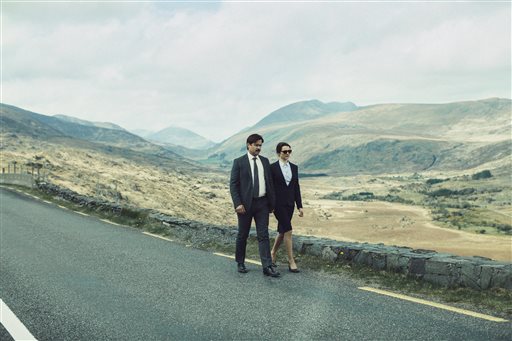
This image released by A24 Films shows Colin Farrell, left, and Rachel Weisz in a scene from the film, “The Lobster.” The movie opens Friday, May 13, 2016. AP
LOS ANGELES — In the world of “The Lobster,” being single is not only looked down on, it’s forbidden by law.
Our entry into this dystopian setting is David (Colin Farrell). His wife has just left him and he must sequester himself in strange hotel filled with other single people in hopes of finding a suitable mate. If he doesn’t pair up with someone in 45 days, though, he’ll be turned into an animal.
It’s already happened to his brother, who arrives at the hotel with David in the form of a dog. David, however, doesn’t want to be man’s best friend. He’s decided that he’d rather be a lobster, which the hotel manager (Olivia Colman) says is an excellent choice.
“The Lobster,” out Friday, is the first English-language film from Greek director Yorgos Lanthimos, best known for the dark satire “Dogtooth.” That breakout, which earned a best foreign language Oscar nomination in 2011, made Lanthimos somewhat of a cult figure among cinephiles and actors alike. It’s why stars like Farrell, Rachel Weisz and John C. Reilly were so eager to get on board with his absurdist, deadpan vision for “The Lobster.”
Reilly said Lanthimos’ stylish blend of formality and stillness with an underlying wicked, cruel humor is the closest he’s ever seen to a Stanley Kubrick.
Farrell, too, recalls how “Dogtooth” stayed with him long after he saw the film.
“I was so provoked and agitated by it and kind of sickened by it and moved by it,” Farrell said. “(Yorgos) has a very specific eye and a very specific perspective on life and love and family and community and grief and all these big things that we have been using art and theater and song to try to uncover hidden meaning in.”
Farrell even packed on some weight for the film to more fully disappear into the character and world.
“(Colin) was a little bit too good looking and seemed like the winner in a film,” Lanthimos explained. The two agreed that David was probably “a bit of an eater” who had grown soft in the coziness of marriage.
The hotel that David finds himself living in is both a resort and a prison. There are pools and hot tubs and idyllic views, but also strict rules and mandatory activities that can be as innocuous as a dance, or as violent as a hunt. And they’re not just hunting animals; they’re hunting loners — a group of singles who have voluntarily exiled themselves from society.
The quest for a mate in this environment is similarly askew and comically specific. Each resident is looking for another person who shares a defining trait with them, like a limp (Ben Whishaw), a lisp (Reilly), or even chronic nosebleeds (Jessica Barden).
“It speaks to a certain kind of superficiality in how we judge how and when we’re able to approach someone in trying to start some kind of relationship,” Lanthimos said. “We’ve made this world that has very strict and particular rules in order to create something that feels very much like our world but is slightly removed from it at the same time so we can reveal a lot of the absurdities of our everyday lives.”
The absurdities only escalate as we delve deeper into the realm outside of the hotel, where we encounter the loners and their deathly serious leader (Léa Seydoux), who has gone to extremes to deter any romantic relationships at all among her followers.
The film is cynical and dark — shockingly so at times — but all agree that Lanthimos doesn’t, ultimately, try to force a specific point of view. There’s even some possible hope that can be gleaned from David’s encounters with Weisz’s character, Short Sighted Woman.
“People should recognize themselves in it. It’s about our behaviors and how much compromise we do in order to fit somewhere or to feel like we belong to something somewhere,” says Ariane Labed, who plays The Maid, and is also married to Lanthimos.
“I think it says a lot about the way you see love or how much you believe in it. The end is quite open. You can make whatever you want out of it.” TVJ